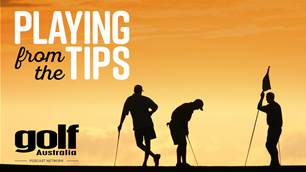“A good walk spoiled? I say a good walk improved.” Dr. Frank Sullivan, University of St Andrews Medical School Director of Research, on the Good-Good Golf podcast last week.
There’s no such thing as a bad walk. Unless you happen to stop and swing a golf club along the way, according to those who campaign for the reduction or abolition of public golf.
Former NSW Premier Bob Carr is the latest public figure to throw his hat in the ‘let’s reduce Moore Park Golf Course to nine holes’ discussion.
And, like all those who have come before him and all those who will come after, he relies predominantly on personal prejudice mixed with a dose of misinformation and a seeming lack of interest in doing any research to stridently and confidently make his case.
It was a little over a month ago that Carr, for no apparent reason, entered the discussion espousing the same tired and uninformed views that have been the specialty of Sydney Lord Mayor Clover Moore for years.
But rather than go over – again – some of the counter arguments to those ill-informed positions, lets instead inject some new and positive information into the discussion.
Health.

Even to those who are opposed to the game, it is undeniable that golf is a physical activity.
This is true even when the game is diluted by the use of a cart instead of walking (don’t do this unless you have to, people. Not only does it rob you of health benefits but also a measure of enjoyment of the game).
And while it is never acknowledged by those on the other side, there is now at least the beginnings of hard evidence about the wide-ranging health benefits of playing golf.
On last week’s Good-Good Golf podcast (yes, that is a shameless plug), University of St Andrews Medical School Director of Research Dr. Frank Sullivan was our guest. (LISTEN HERE)
Dr. Sullivan was part of a pilot study run in Fife, home of the Old Course, where patients were ‘prescribed’ golf as part of their treatment.
The results were encouraging – though typical of golf, multi-faceted – and should be taken into account whenever discussions about closing public golf courses arise.
“Our drive in this was about making the connection between people who might benefit from playing golf and the health system,” Dr. Sullivan said.
“It’s well established that there’s a problem in western society of people not getting enough exercise.
“The WHO (World Health Organisation) published last year on this and were recommending levels of exercise that are far beyond what most people do.”
Changing that behaviour, though, is the key to improving outcomes and that’s where the pilot study had its roots.
"And while it is never acknowledged by those on the other side, there is now at least the beginnings of hard evidence about the wide-ranging health benefits of playing golf." – Rod Morri.
“Other people in my department who are interested in behavioural change – psychologists and sociologists –did a number of studies about this overall, not just particularly with golf,” he said.
“But they carried out a systematic review of the literature, they did some interviews and focus groups with patients and members of the public to find out what the issues were.
“And because we’re in St Andrews they had an interest in exploring whether there might be something that we could do together between the university and the R&A and those things came together.”
Local GP’s and local golf courses were contacted and according to Dr Sullivan there was little resistance to the idea.
The trial involved local doctors ‘referring’ appropriate patients to local courses where golf professionals ran clinics organised especially for the groups.
The feedback was positive with 57 percent of those who took part completing the program and saying it was beneficial for them, while the majority of the 43 percent who didn’t opt in suggesting their reluctance was more about timing than the program itself.
As for the results, the benefits were both physical and mental, according to Dr Sullivan.
“I think the companionship was coming through quite a lot,” he said.
“Many older people are becoming a bit isolated in modern society and if you get them out with three or four friends, that is a big help.”
None of this will come as a surprise to golfers, of course, but it is not those of us who already play who need to consider it most.
That is for those who hold the opposing view to do, and it is to be sincerely hoped they do.
As has been said in this space many times, golf has no intrinsic right to exist and the game must make its case.
But in the same vein those on the other side don’t have the right to simply dismiss the game and take it away from others who do enjoy it (and its many – now substantiated – benefits).
We as golfers need to make the case for the game – in good faith – and it is up to Clover Moore and Bob Carr to argue their side the same way.
Related Articles

Playing From The Tips Ep.120: Evian, Scottish Open, LIV Andalucia & more

Playing From The Tips Ep.119: John Deere, BMW International Open & International Series













